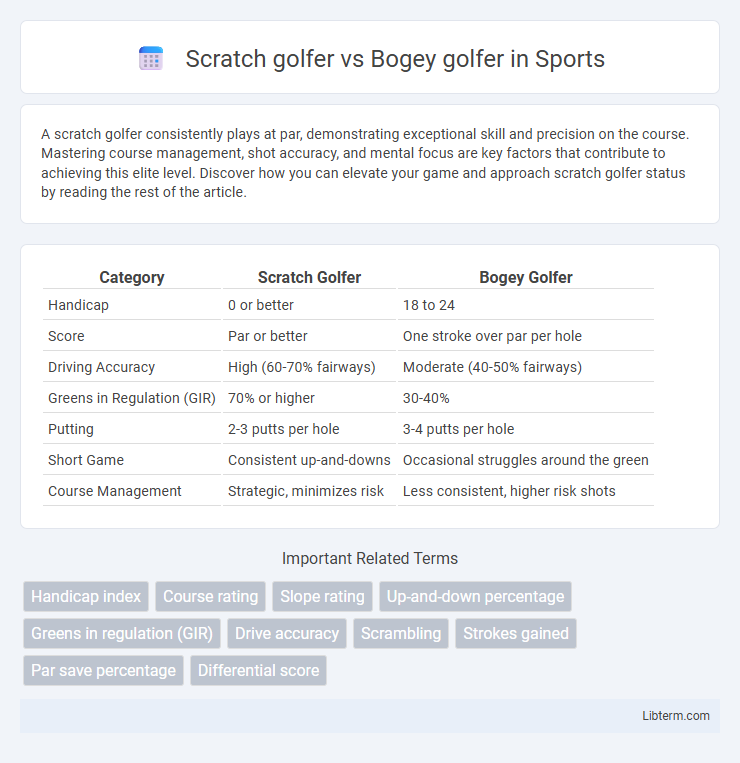A scratch golfer consistently plays at par, demonstrating exceptional skill and precision on the course. Mastering course management, shot accuracy, and mental focus are key factors that contribute to achieving this elite level. Discover how you can elevate your game and approach scratch golfer status by reading the rest of the article.
Table of Comparison
| Category | Scratch Golfer | Bogey Golfer |
|---|---|---|
| Handicap | 0 or better | 18 to 24 |
| Score | Par or better | One stroke over par per hole |
| Driving Accuracy | High (60-70% fairways) | Moderate (40-50% fairways) |
| Greens in Regulation (GIR) | 70% or higher | 30-40% |
| Putting | 2-3 putts per hole | 3-4 putts per hole |
| Short Game | Consistent up-and-downs | Occasional struggles around the green |
| Course Management | Strategic, minimizes risk | Less consistent, higher risk shots |
Defining a Scratch Golfer
A scratch golfer is defined as a player with a handicap index of zero, indicating the ability to play to par on any rated golf course. This level of skill reflects consistent ball striking, precise course management, and strong mental focus under pressure. In contrast, a bogey golfer typically has a handicap around 20, averaging one stroke over par on each hole and requiring different strategic approaches to improve accuracy and scoring.
Understanding a Bogey Golfer
A bogey golfer typically scores about one stroke over par on each hole, averaging around 90 strokes for an 18-hole round, indicating moderate skill and consistency. Understanding a bogey golfer involves recognizing their common challenges such as less precise ball-striking, occasional difficulties with course management, and inconsistent putting compared to a scratch golfer who scores at par or better. This distinction helps golf instructors tailor practice strategies to improve a bogey golfer's accuracy, course strategy, and short game proficiency.
Key Differences in Golf Handicaps
Scratch golfers typically have a handicap of 0, indicating they can play at par on any rated course, while bogey golfers usually have handicaps around 18 for men and 24 for women, reflecting a skill level that scores one stroke over par per hole on average. The key difference lies in consistency and accuracy; scratch golfers demonstrate precise shot making and course management, whereas bogey golfers often struggle with control and may require multiple strokes on tougher holes. Handicap systems like the USGA Course Handicap precisely quantify these skill gaps, allowing fair competition by adjusting for each player's expected performance.
Skill Set Comparison: Scratch vs Bogey
Scratch golfers consistently achieve par or better, demonstrating advanced shot accuracy, course management, and mental toughness. Bogey golfers typically struggle with consistency, often missing greens in regulation and facing challenges with short game precision. The primary skill gap lies in the ability of scratch golfers to execute a higher percentage of quality shots under pressure, resulting in lower overall scores.
Course Management Strategies
Scratch golfers excel in course management by accurately assessing risks and choosing safer shots that maintain par or better, utilizing precise club selection and targeting strategic landing zones. Bogey golfers often struggle with consistent shot placement and may take unnecessary risks, leading to increased penalties and higher scores. Effective course management for bogey golfers involves playing to individual strengths, avoiding hazards, and prioritizing conservative play over aggressive attempts.
Mental Game: Focus and Resilience
Scratch golfers demonstrate superior mental focus and resilience, maintaining concentration through pressure-filled shots and recovering quickly from errors. Bogey golfers often struggle with maintaining consistent mental focus, leading to frustration and lapses in decision-making during play. The ability to stay mentally composed under stress significantly differentiates scratch golfers from bogey golfers in performance.
Typical Mistakes Made by Bogey Golfers
Bogey golfers often struggle with inconsistent swing mechanics, leading to poor ball contact and frequent mishits such as topped or thin shots. They tend to misjudge distances and club selection, resulting in shots that fall short or go beyond the target, increasing their score. Common errors also include subpar course management, such as attacking risky pins instead of playing conservatively, which contrasts with the precise and strategic approach of scratch golfers.
Practice Routines: How Each Golfer Trains
Scratch golfers engage in meticulously structured practice routines emphasizing precision in swing mechanics, short game proficiency, and course management strategies, often integrating data analytics and video feedback to refine performance. Bogey golfers typically focus on consistency and fundamental skills, dedicating practice time to improving basic swing techniques, bunker shots, and putting accuracy without the same level of technical analysis. The difference in training intensity and methodology directly influences scoring potential, with scratch golfers adopting more disciplined and varied drills tailored to eliminating errors and optimizing shot selection.
Equipment Choices and Preferences
Scratch golfers prefer high-performance clubs with advanced technology and custom fitting to maximize precision and consistency in their swings. Bogey golfers often choose forgiving clubs with larger sweet spots and more perimeter weighting to help minimize mishits and improve game stability. While scratch golfers experiment with a variety of shafts and grips tailored to their exact swing characteristics, bogey golfers tend to select more standard equipment that enhances playability and comfort.
Pathways to Progress: From Bogey to Scratch
Transitioning from a bogey golfer, who typically shoots around 90-99, to a scratch golfer, playing at par or better, requires focused skill development and strategic practice. Key pathways to progress include improving short game accuracy, mastering course management, and enhancing consistent ball striking to reduce strokes per round. Tracking performance metrics like fairways hit, greens in regulation, and putts per round enables targeted improvement and accelerates the journey to scratch-level golf.
Scratch golfer Infographic

 libterm.com
libterm.com